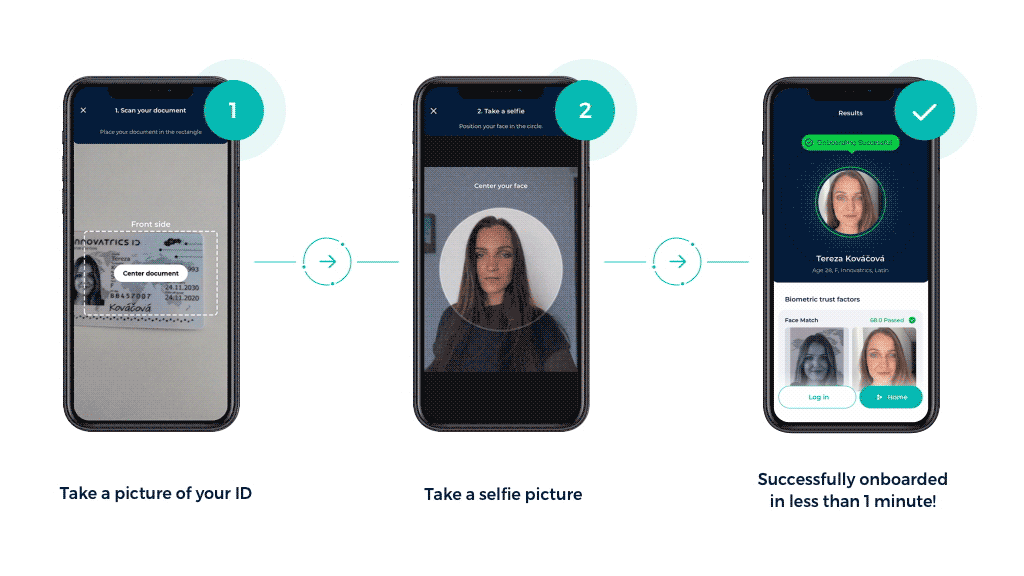KYC definition
KYC, or Know Your Customer, is a process for businesses to verify the identity of their clients. It involves collecting information, such as identification documents and biometric data, to confirm a customer’s identity. This ensures compliance with regulations, prevents financial crimes, and strengthens trust between businesses and customers.
What Is KYC?
KYC, or Know Your Customer, is the process by which businesses verify the identity of their clients to ensure they are who they claim to be. This is essential for financial institutions, online service providers, and other organizations to prevent fraud, money laundering, and terrorist financing.
KYC takes on a more sophisticated approach when biometric technology is introduced. With biometrics, businesses can verify a customer’s identity using unique physical traits, like fingerprints, facial recognition, or iris scans. This adds an extra layer of security by ensuring that only authorized individuals have access to sensitive information.
One application of biometric-based KYC is in eKYC, which stands for Electronic Know Your Customer. This process allows customers to remotely verify their identities using biometrics through digital channels, such as mobile apps or online platforms. By simply scanning their fingerprint or taking a selfie, customers can securely prove their identity without the need for traditional in-person verification methods.
Biometric Technology in KYC Compliance & Verification
Biometric technology significantly improves the efficiency of KYC compliance and verification by providing a highly secure and accurate way to verify a customer’s identity. It is scientifically proven that each individual has a set of unique fingerprints and facial features. Using them for biometric comparison, it’s virtually impossible to impersonate another person.
This enhances security but also streamlines the customer onboarding process. It eliminates the hassle of submitting physical documents, reducing paperwork and processing time. As a result, it benefits both businesses and customers by providing a convenient and efficient way to verify identities in a digitized world while maintaining the highest level of security.
Steps in Performing Biometric KYC Process
The following processes comprise the fundamental steps in performing KYC:
Data Collection
Gather necessary information from the customer, such as identification documents and biometric data like fingerprints or facial images.
Biometric Verification
Use biometric technology to verify the customer’s identity. This involves scanning and matching their unique physical traits, like fingerprints or facial features, to ensure they are who they claim to be.
Validation
Confirm the authenticity of the collected data by comparing it with trusted sources, such as government databases or previous records.
You can learn more about this step by reading our use case study about National Identity Register Solution.
Risk Assessment
Evaluate the level of risk associated with the customer to determine if additional scrutiny is required. This helps identify potential fraudulent activities or high-risk individuals.
Monitoring
Continuously monitor customer activities for any suspicious behavior or transactions. By keeping a watchful eye, businesses can detect and prevent fraudulent activities in real time.
What Industries Benefit From Biometric KYC Processes?
Industries like banking and finance, healthcare, government services, telecom providers, the sharing economy, and e-commerce can significantly benefit from using biometric KYC (Know Your Customer) or eKYC processes.
These industries deal with sensitive customer information and require stringent identity verification measures to prevent fraud and comply with regulations.
If you’re in the Telecom business, feel free to read our case study that will give you a better overview on how you can reach more customers and verify their identities securely.


Ensuring Privacy & Security in KYC
To maintain privacy and security when performing KYC with biometric technology, it is essential to:
- Encrypt Data: Ensure that all biometric data is encrypted to protect it from unauthorized access.
- Secure Storage: Store biometric data in highly secure databases with restricted access.
- Compliance: Adhere to data protection regulations and ensure proper consent is obtained from customers before collecting biometric data.
How Do You Select a Trustworthy KYC Partner?
When selecting a trustworthy KYC partner, consider the following factors:
Reputation
Always research the partner’s reputation in the industry and their track record with previous clients. Read testimonials and reviews, check out third party benchmarks, and ask relevant questions to find the right partner.
Compliance
Ensure the partner complies with all relevant regulations and standards for data protection and security. Check their websites and find the listed certifications and approvals.
Technology
Evaluate the partner’s biometric technology and capabilities to ensure it meets your specific KYC requirements.
Implementing biometric technology in KYC processes offers a highly secure and efficient way to verify customer identities, prevent fraud, and ensure regulatory compliance. By leveraging biometric methods such as fingerprint recognition, facial recognition, and iris scans, businesses can enhance security, protect customer data, and build trust with their clients in various industries.
It is crucial to prioritize privacy and security measures when implementing biometric KYC processes and to choose a reliable partner with expertise in biometric technology and regulatory compliance.
